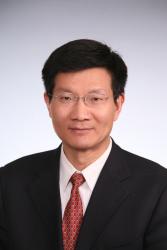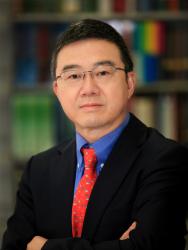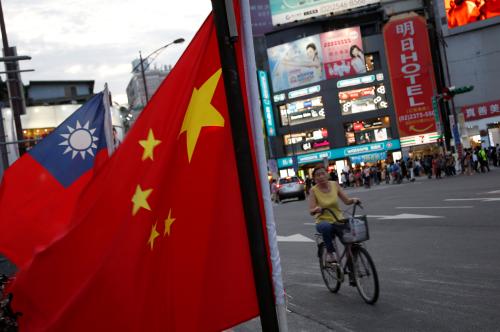2021
Content from the Brookings-Tsinghua Public Policy Center is now archived. Since October 1, 2020, Brookings has maintained a limited partnership with Tsinghua University School of Public Policy and Management that is intended to facilitate jointly organized dialogues, meetings, and/or events.
On May 30, 2012, Dr. GAO Qin, associate professor at Fordham University in New York City was invited by Brookings-Tsinghua Center for Public Policy to deliver a speech about Chinese welfare state at the School of Public Policy and Management of Tsinghua University. Her speech was titled “The Chinese Welfare State in Transition: 1988-2007.” Dr. Wang Feng, the director of Brookings-Tsinghua Center, moderated this event.
Dr. GAO Qin first put forward a very important concept—the welfare state, and gave her own definition. She coined it as “public provision of cash and in-kind benefits to protect and improve the well-being of its citizens.” The core values of the welfare state are equal opportunity and public responsibility for private vulnerability. It also comprises of three key components—social relief, social insurance and social investment.
After conceptualizing the welfare state, Dr. GAO Qin proposed two questions, asking everyone that whether China is a welfare state and if so, what it looks like. She then resolves these questions in following four aspects—size and structure, impact on income equality, progressivity and cross-national comparison. She considered that, conceptually, China is arguably a welfare state according to its ideology, regime and market economy. However, based on CHIP data, China is a divided welfare state. She finds that the Chinese welfare state is much divided along the urban-rural line: the urban social benefit system, or the urban welfare state, stands among the more comprehensive and generous ones similar to those in the western industrialized countries, while the rural system is minimal and residual and similar to those in the least developed countries. The urban system has consistently reduced income inequality—despite to a lesser extent in recent years—and has remained progressive over time. The rural system had little impact on reducing income inequality and has been largely regressive. It is, however, moving toward a more progressive direction as indicated by the 2007 results. The social benefits for the migrants had significant increases from 2002 to 2007 and played an increasingly larger redistributive role. They are also moving toward a more progressive direction.
Finally, she concluded that China is a divided welfare state. To deal with this situation, she thought that China should pay much more attention to rural residents and migrants; learn more about the urban poor and the effectiveness of current policies; and balance economic growth, social development and human security.
After the keynote speech, Dr. Wang Tianfu, a nonresident fellow at Brookings and professor of the School of Humanities and Social Science of Tsinghua University, and Dr. Li Shi, professor of School of Economics and Business Administration of Beijing Normal University, made comments.
At the end, speakers took questions from audience.
Agenda
-
May 30
-
Commentators
 Tianfu Wang Former Brookings Expert, Professor and Chair of Sociology, Deputy Dean - School of Social Sciences, Tsinghua University
Tianfu Wang Former Brookings Expert, Professor and Chair of Sociology, Deputy Dean - School of Social Sciences, Tsinghua University -
Moderator
 Feng Wang Former Brookings Expert, Professor - Sociology, University of California, Irvine, Professor - Fudan University in Shanghai
Feng Wang Former Brookings Expert, Professor - Sociology, University of California, Irvine, Professor - Fudan University in Shanghai -
Keynote Speaker
-
